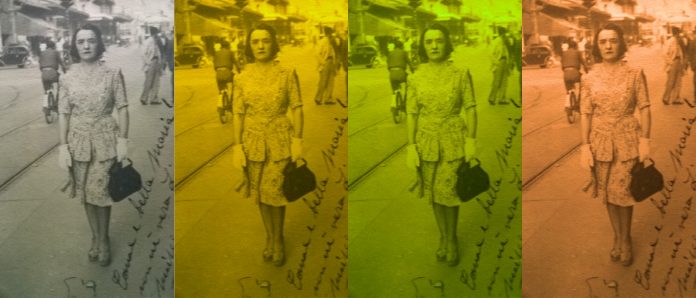by Rita Siligato
Everything was waiting for them in the heath of June: the Central Station of Trieste was crowded with overheated people examining the arrivals board. Even the walls and the pillars were sweating in the damp afternoon. Mama and Redenta were standing together on the platform. Redenta felt uncomfortable in her new pink suit: it had suddenly become too heavy for the season, the skirt was a bit tight, and the short-sleeved jacket pinched at the armpits.
“I hope they will arrive on time,” said mama. She never spoke in a low voice, and the people around turned to look at her. A woman snorted, telling something to her neighbor. Redenta blushed: “Mama, you said that before. In a few minutes…”
“Il treno Calais-Trieste è in arrivo al binario 3.”
Saved by the loudspeaker, thought Redenta, and not by HER voice.
“Mama, have you heard? They are coming!”
The dusty engine made its appearance in slow motion, bending a bit to tackle the tracks.
“Here they are, here they are!”, shouted mama. But everyone was shouting now.
When the train stopped, a railway worker in a dark uniform wearing a hat with a visor opened the doors of the trucks. Far away they saw Nella’s slender figure dismounting backwards the steep metal steps. She was trying to carry down an enormous suitcase without knocking it.
“Nella, Nella!”
Redenta was shouting too, pushing the other people, trying to step closer to her sister to help her. She almost forgot the children. But mama was quicker to reach her eldest daughter: “Nella, your kids?”
“Oh my! Rachel, Duncan, Jasper, stay closer. Come down, you three. Come here, help mama.”
She was a mama now, Redenta thought. She was feeling an odd lump in her throat, she could not say anything at this crucial moment.
Nella was wearing a peculiar pale blue dress, made of a shiny material, short at the knee, with a sweetheart neckline, a fitted waist and a full skirt. But she was so thin! She had always been slim, but now you noticed her tired face, the salt cellars under her neck; and her sinewy arms were so pale. She does not look like Nella, the girl who was always the first to obtain a deep tan and a shiny golden-brown skin in the first days of summer.
“How come you are so white?”
These were the first words Redenta could utter, after so many years. After more than ten years of endless letters coming and going over the sea, of tears, of mutual secrets shared. But Nella shooed away her words with a shrug.
“We will talk later,” she whispered. “Not in front of mama and the children.”
“But look at them! Rachele! Here is nonna! Come and give us a hug!”
Mama almost kneeled on the tiles of the platform and opened her arms waiting for Rachel.
The girl was shy: she tried to hide by her mama’s side, grabbing her skirt with sweaty hands.
“Go, Rachel! Go and give granny a kiss!”
Rachel was practically eight years old – this is what she used to say – and very determined. Like someone about to take a very dangerous step, she planted her kiss on her grandma’s cheek as if it was a punch in the face, clean and sharp.
Duncan was six years old, going for seven; Jasper was only three, and his face was almost hidden by a pair of huge glasses with a thick black frame. The boys were dressed in shorts and identical striped jerseys. They stood holding hands by the train, as if it was a shelter, the last thing to remind them of home, petrified by the unknown people they were asked to greet and kiss, to recognize as grandma and aunt.
“Should the baby wear glasses? At his age?”
“He’s cross-eyed, mama. These are prescription glasses.”
“But look at him! He looks like a professor!”
He was never Jasper or Jas, in Trieste: he become The Professor. He looked around with his eyes magnified by the lenses, and in the presence of Redenta or mama he never spoke for two months.
“And Harry?”
“He has to work. He will come next time, hoping we will have a next time to visit home. But mama, you look fine! And Redenta is a grown-up woman, now!”
The sisters stared at each other: Redenta noticed Nella’s freshly permed hair, shorter now than ten years ago, and lighter. Nella, with Rachel still holding on her mother’s full skirt, moved closer and hugged Redenta, laughing and crying.
“All the kilos I lost went to you! You have a perfect pinup figure, now!”
Mama broke into Nella’s speech, in her usual sharp manner: “And I promise you that in two months you will regain all the kilos you have lost. You must be famished! Let’s take the trolleybus and go home, to have something to eat. Do the children like pasta col sugo?”
Rachel and Duncan smiled at their grandma: definitely, these were words they understood.





























